 |
Jelena Ristić Trajković, University of Belgrade – Faculty of Architecture
Jelena Ristić Trajković is an Associate Professor and Vice Dean for Research and Innovation at the University of Belgrade – Faculty of Architecture. She also teaches at the University of Arts in Belgrade – Faculty of Applied Arts. With a PhD in Architecture and Urbanism, her primary research interests include transdisciplinary methodologies related to design education, design for social transformation, sustainability and resilience, the relationship between space and health, and the application of environment-behavior theories in design. Her approach aims to bridge theoretical frameworks with practical applications, emphasizing critical reflection and design’s role in fostering reconnection with nature, regenerative and healthier environments and communities. |
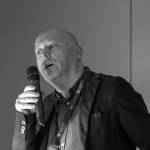 |
Lamberto Amistadi, University of Bologna
Lamberto Amistadi is an architect and an associate professor in the Department of Architecture at the University of Bologna – Cesena Campus and the coordinator of the ArchéA program. He is the deputy director of the scientific journal FAMagazine, devoted to research and projects concerning architecture and the city, and co-director of the series TECA, Teorie della Composizione architettonica (Naples: Clean). Along with Ildebrando Clemente, he founded and directs the series SOUNDINGS: Theory and Architectural Openness (Florence: Aión), which has included monographic volumes on John Hejduk and Aldo Rossi. He is also the author of numerous publications. |
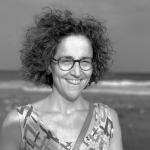 |
Marta Benages Albert is an architect with a Master’s degree in Landscape Management and Design and a PhD in Architecture. Her main research interests are urban health, citizen participation, pro-environmental behavior, and qualitative research.
Her doctoral thesis “Designing suburban landscapes based on everyday experiences: the importance of incremental appropriation in the participative regeneration of metropolitan river corridors” analyzed person–place relationships in metropolitan river corridors. She showed their growing use as collective spaces, highlighted the integration of social dimensions into European regeneration policies, and proposed a theoretical model of space appropriation as an open, long-term process that fosters bonds and citizen engagement. During her predoctoral stage (Júnior Faculty grant), she collaborated with the Laboratoire de recherche en projet de paysage at ENSPV, strengthened her expertise in qualitative methodologies, and led participatory mapping with adolescents in Caldes Stream 2.0. Learning from Experience. She later coordinated a work package in Decision-making Framework for the Participatory Rehabilitation of Urban River Corridors (Recercaixa 2015), expanding participatory mapping to the whole community through a public participation web GIS and organizing workshops that led to the creation of Live the Stream (Viu la Riera). This initiative gave rise to VoluntaRius. Characterization of Environmental Volunteer Groups in River Areas, a project she led as principal investigator, which characterized volunteer groups in the Besòs basin and theorized their life experiences and psychological drivers.
She has also coordinated the qualitative research group in Visitors’ Mobility in the City of Barcelona after COVID-19 (VISITMOB), funded by Fundació La Caixa and the Barcelona City Council, focusing on residents’ perceptions and women with children under a gender-sensitive approach. In parallel, she has studied the salutogenic effects of river environments, collaborating in Social and Environmental Determinants of Physical Activity in Patients with COPD, co-supervising the dissertation Assessing Leisure Time Physical Activity in Urban Stream Corridors (2020), and, since 2022, coordinating the Master in Urban Design for Healthy Cities at UIC Barcelona. She is currently a researcher in the EDUCLIMA project, developing an app to measure the positive impact of socio-ecological actions, and participates in the European project New Paradigms of Sustainability for Inclusive and Smart Latin American Cities (POLIS), which creates educational programs for sustainable, inclusive urban planning. She also contributes to the project Modification of Walking Routines of Older Adults through Co-design: Effects on Quality of Life and Health Activation (UIC Barcelona, 2024), advising on the qualitative research component to understand older residents’ experiences and perceptions. |
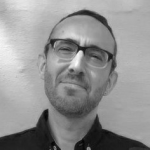 |
Oswald Devisch, professor of Civic Urbanism at Hasselt University Belgium
He graduated as civil engineer architect from KU Leuven and took an MSc in Urban Design at the Bartlett School of Architecture (London). He obtained a PhD from Eindhoven University of Technology in spatial simulation modeling. Since 2006, he has been a lecturer/researcher at the Faculty of Architecture and Art at Hasselt University. Together with Liesbeth Huybrechts and Stefan Devoldere, he leads the Civic Policy & Design research line, which investigates how we can strengthen the capacity of collectives of governments, organizations, and citizens to jointly reflect on and intervene in the spatial transformation processes taking place in their daily living environments. In recent years, he has been involved in European projects such as Play!UC, a study on the role of games in spatial planning processes; CAPA.CITY, a study on the role of collectives in transforming residential subdivision; LISTEN, a study on the role of listening in the transition to 15-minute cities; and REWORLDING, a study on how ecological processes cause social polarization. In addition, he conducts research into themes such as collective learning, serious participation, autonomous transformation processes and the gamification of citizen participation through government contracts and contract research. |
 |
Ann Holt PhD (she, her)
Assistant Professor of Art Education and Women’s Gender & Sexuality Studies at the Pennsylvania State University, at University Park, PA (USA), Dr. Ann Holt is an American and Canadian artist educator. She holds a B.F.A. in painting from the San Francisco Art Institute (California, USA) and an M.A. in art education from Concordia University in Montreal, Quebec (Canada). She completed her doctoral work in art education with a minor in women’s, gender and sexuality studies at the Pennsylvania State University in 2007. She also serves as an artist teacher/researcher and advisor to Arts Action Group, an international community-based collective committed to facilitating arts initiatives in conflict-affected environments. In 2023 she became co-editor-in-chief of the open access journal Arts, Culture & Development launched from her co-edited publication from Routledge UK’s Rethinking Development Series, Arts and Culture in Global Development Practice: Expression, Identity, and Empowerment. Holt’s published scholarship focuses on issues of access to knowledge and archives, marginalized histories of art education, and the role of arts and culture in social transformation. Her work is published in peer-reviewed journals such as Studies in Art Education, Art Education, International Journal of Education and the Arts, Canadian Art Teacher, and Groundworks. She serves on the executive board of the National Art Education Association (NAEA) Coalition of Feminisms in Art Education and in the role of research coordinator with a focus on amplifying emerging feminist researchers. Since 2020, she is the NAEA liaison to New York State Art Teacher Association’s Equity, Diversity & Inclusion task force. From 2015 to 2017, she was Executive Director of feminist artist Linda Stein’s social justice arts non-profit, Have Art Will Travel! Inc.. Since its inception in 2016, she continues to serve on a curriculum team to expand social justice curricular opportunities around Stein’s exhibitions for the website Social Justice Art Education with Linda Stein. In 2022, the curriculum team published Teaching and Assessing Social Justice Art Education: Power, Politics, and Possibilities (Routledge USA), based on collaborative research on assessing social justice principles in teaching.
|
 |
Jordi Honey-Rosés is an urban planning scholar focused on sustainable mobility, active transportation, and the transformation of public space. He holds degrees from the University of California, Berkeley (BA History, BA Political Economy 2000) and Harvard University (MPP 2007), and earned his PhD in Urban and Regional Planning from the University of Illinois at Urbana-Champaign. He currently leads City Lab Barcelona at the Institute of Environmental Science and Technology (ICTA-UAB), where his applied research explores how evidence-based interventions can foster healthier, more inclusive cities. He is also the founder of BiciZen, a citizen platform that supports everyday cyclists and promotes safer, more people-centered urban mobility.
|
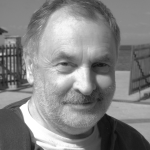 |
Yuriy Kryvoruchko, Prof., DSc. Ph. D, Arch.
Throughout his career, Professor Yuriy Kryvoruchko has held leadership positions at the National University „Lviv Polytechnic” — he headed the Department of Urban Planning (1993–2010) and continues to serve as a Professor at the Department of Visual Design and Art.
Professor Kryvoruchko also held the positions of Chief Architect of the City of Lviv, Director of the Department of Architecture of the Lviv City Council, and Chairman of the City’s Architectural and Urban Planning Board (2006–2012).
In 2023, Professor Kryvoruchko became one of the founders of the Ukrainian branch of INTBAU (the International Network for Traditional Building, Architecture and Urbanism). He is the author of over 200 scientific publications in the fields of urban planning, landscape architecture, and sacred architecture. He has received several grants from the Soros Foundation and the TACIS program.
From 2004 to 2008, he worked as a Professor at the Agricultural Academy in Szczecin (Poland), and from 2008 to 2010 — at the West Pomeranian University of Technology (Department of Landscape Architecture) (Poland). Since 2024, he has been Professor at the Department of Architecture of Local Cultures at Białystok University of Technology. He has also been a Visiting Professor at the Faculty of Architecture of Warsaw University of Technology (2022–2023), the University of Agriculture in Krakow (2025), Cracow University of Technology (2013, 2022), and Silesian University of Technology in Gliwice (2022–2025). |
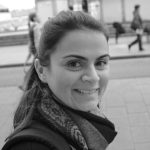 |
Stefania Landi, Politecnico Milano
Stefania Landi graduated in Building Engineering and Architecture and obtained her PhD in Architectural Restoration at the DESTeC department of the University of Pisa. Her research interests concern the theoretical and technical aspects of conservation and reuse of the architectural heritage, with particular attention to 20th century architecture and the problems of conservation of reinforced concrete. She is a member of Centro di Studi per la Storia dell’Architettura di Roma, member of ICOMOS Italy, and vice-president of the ICOMOS-International Scientific Committee on 20th Century Heritage. She has been visiting PhD Student at the Getty Conservation Institute (Los Angeles, CA) under the Conserving Modern Architecture Initiative, and visiting lecturer at the Silesian University of Technology (Gliwice, Poland) under the Erasmus+ programme. She published and presented her research studies in several international conferences on architectural conservation. |
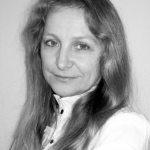 |
Svitlana Linda, Lviv Polytechnic National University
Svitlana Linda – Doctor in Architecture, Professor at the Department of Architecture and Urban Planning, Faculty of Civil Engineering and Architecture, Opole University of Technology, and Doctor Habilitatus in Architecture at the Department of Design and Fundamentals of Architecture, Institute of Architecture and Design, Lviv Polytechnic National University. A graduate of the Faculty of Architecture at Lviv Polytechnic, where she also obtained her doctoral degree in 2000 and habilitation in 2014. Her research focuses on cultural heritage, with particular emphasis on 19th–20th century architecture and urban planning. She has been a scholarship holder of ÖAD within the framework of cooperation between TU Wien and Lviv Polytechnic (Austria) (2003, 2007, 2014) and of the International Cultural Centre in Kraków (Poland) (2017), as well as a participant in numerous teaching and research fellowships at academic institutions abroad. |
 |
Stephan Treuke (PhD)
Since 2020, he has been working at Emschergenossenschaft and Lippeverband, Germany’s largest water board, as Project Director of Emscherland, the International Garden Exhibition 2027, and Emscher 2020. His work focuses on integrated project coordination, climate change adaptation strategies, public participation processes, and the organization of international events.
He specializes in large-scale green infrastructure, regional master planning, and urban climate adaptation. As a lecturer at TU Dortmund University and Ruhr University Bochum, he teaches international city planners about the potential of large-scale green megaprojects. He also acts as a counselor for international cooperation projects, with a focus on integrated water management and transformative governance.
He holds a Master’s degree in Geography and languages, as well as a PhD in Social Sciences, and has over nine years of experience in university teaching and research in urban planning, public space, and landscape development in Germany and abroad.
|
 |
Jan Vanrie, Hasselt University, Belgium
Prof. dr. Jan Vanrie holds a Phd in Psychology and is currently an associate professor of Human Sciences and Research Methodology in the faculty of Architecture and arts at Hasselt University (Belgium). He heads the research line ArcK-Designing for More, which explores how different spatial environments are experienced by people and how to support designers to create environments and spaces that lead to more inclusion, to more experience, and to more wellbeing. His own research is at the intersection of environmental psychology, (interior) architecture, design and education, with a particular focus on diversity, healthcare and educational settings and inclusive design/universal design. |
 |
Christoph Woiwode (PhD) is currently a senior researcher at the Leibniz Institute of Ecological Urban and Regional Development (IOER) in the research area Landscape, Ecosystems and Biodiversity. Christoph was a two-time, long-term Resident Visiting Professor with the Indo-German Centre for Sustainability (IGCS) at Indian Institute of Technology Madras (2013-2016, 2019-2024). He has accumulated over twenty-five years of lived and work experience in India. Holding a PhD in Planning Studies from the Development Planning Unit, University of London, Christoph graduated in urban and regional planning (TU Berlin) and social anthropology (FU Berlin). Christoph hast taught as a Senior Lecturer in Human Geography in the UK (2017-2019), a lecturer at the Faculty of Spatial Planning, TU Dortmund, Germany (2008-2012), and also served as a planning advisor with the German development agency GIZ in Sri Lanka (2005-2007). His cross-disciplinary research areas cover sustainable urbanisation, climate change and disaster risk mitigation, inner transformation to sustainability, urban governance, development studies, India/South Asia. |